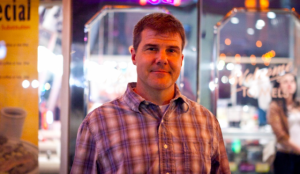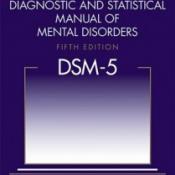 Paul Gilmartin, a stand-up comedian since 1987, co-hosted TBS’ Dinner and a Movie for over 15 years and appears frequently as a guest on Adam Corolla’s comedy podcast, where he performs political satire as the fictional right-wing congressman Richard Martin.
Paul Gilmartin, a stand-up comedian since 1987, co-hosted TBS’ Dinner and a Movie for over 15 years and appears frequently as a guest on Adam Corolla’s comedy podcast, where he performs political satire as the fictional right-wing congressman Richard Martin.
Gilmartin was diagnosed with clinical depression in 1999, and in 2011, he began The Mental Illness Happy Hour, a weekly podcast that aims to let those affected by mental health concerns such as depression and addiction know that they are not alone, that help is available, and that hope is possible. On the show, artists, doctors, and other individuals address mental health issues and their effects. Listeners can also visit the show’s website to fill out surveys answering questions about their individual mental health challenges or post on the message board to communicate with other listeners who may be experiencing mental health concerns.
This July GoodTherapy.org interviewed Gilmartin about his work with The Mental Illness Happy Hour podcast:
Paul, can you tell us what inspired you to create The Mental Illness Happy Hour and how you came up with the name?
I came up with the idea for the podcast when I tried going off my meds and my depression and suicidal thoughts came roaring back. I didn’t realize it was the darkness. I thought it was reality. It had been five months since I stopped taking my meds, so I thought I was in the clear, but I wasn’t. I had been in support groups, in therapy, and under the care of a psychiatrist for years, and I was fooled by the darkness. I thought, “Someone needs to get the word out there about the cunning nature of mental illness.” I wanted the name to be something that gave people a chuckle, because I knew humor would be an important part of the podcast. I felt like there was a void in the way mental illness was being talked about. It seemed to be either too academic or too new age for my tastes. Not being a professional, I knew my role would be more for comfort and laughter than expert advice. I do give advice, but most of the time that advice is, “Go talk to a therapist or join a support group.”
How long did it take you to be so comfortable with being open and vulnerable, sharing extremely personal details in such a public forum? How do you accommodate guests who aren’t initially very comfortable?
I think being open and vulnerable wasn’t that difficult for me because I have been in support groups for years, and that’s how we talk among ourselves. That being said, I don’t think I anticipated sharing all the stuff I’ve shared. Mostly things I discovered as I was doing the podcast. Probably the best example is processing the things my mom did that were incestuous or at the very least really creepy and inappropriate. I was torn between feeling too much like an exhibitionist and feeling incredibly comforted by the listeners’ responses, which I now know is pretty textbook for people who have experienced sexual violation. I’ve discovered the stuff the listeners appreciate the most is the stuff that’s the hardest to talk about. But I do second-guess myself a ton. Once you put it out there, you can’t take it back.
I’m not sure I can put into words how I get guests to open up. I think the most important thing is to let them know it’s a judgment-free zone and that nothing is too dark or heavy to talk about. It helps if a guest is familiar with the show so they know that coming in. I think when I chime in with something embarrassing or unflattering about myself, it helps. I know for sure a lot of the episodes wouldn’t have been possible if they were done by phone or Internet. Eye contact is huge in establishing intimacy. I discovered in therapy that the way my therapists looked at me was sometimes as important as what they said in terms of me feeling safe. The look on an interviewer’s face is pretty important, and thankfully I don’t have to fake anything. I genuinely am interested and want them to feel safe.Each episode has its own distinctive character, tackling personal topics, stories, and emotional reactions. How do you prepare for each interview—do you have specific questions for each guest, or is it more of a free-flowing conversation?
It’s totally free flowing. I think of it as more of a conversation than an interview. I think it leads to a more organic feel, although sometimes I’ll look back and wish I had asked something I didn’t. If I had written questions down, I might have gotten it. But I never write questions down.
You do a wonderful job facilitating a community for your audience—sharing their emails and anonymous survey responses, establishing/moderating a forum to encourage conversations and listener engagement, and frequently having your listeners on as guests. Was listener involvement something you always envisioned as such an integral part of the show?
Thank you. I never imagined the listeners would be so integral to the show. As the show evolved and I began to get confessions, questions, and input from the listeners, I realized they could greatly expand the breadth and detail of topics. I have probably learned more from the anonymous surveys than I have from my guests, which makes sense since we tend to divulge a lot more when we’re anonymous. Plus I’ve only interviewed a couple hundred people, whereas I’ve read at least 15,000 survey responses.
You incorporate humor very tastefully within the scope of your interviews, while the overall tone of the show can be very heavy, raw, and serious in subject matter. How does humor fit within the context of difficult conversations?
The humor is never really planned, and sometimes my attempts can backfire, but overall I think it’s worth it. I never feel like I have to be funny. There are many episodes where there is little or no humor, and I’m OK with that. And there are episodes, especially the live ones, where there is tons of humor. I’m happy with the balance, but it’s never a conscious thing. There are few things I enjoy as much as a good laugh with a guest just as they’re tapering off from a hard cry. It’s like life packed into a 10-second chunk.
Ultimately, it depends on the guest. When I have a fellow comedian, I know I can say anything. When it’s a person I’ve never met before, I kind of feel my way around. I have edited out more than a few moments where something falls flat and derails the conversation.
Another unique aspect of The Mental Illness Happy Hour is the focus on artists and comedians who have experienced mental health conditions. Have you noticed any shared negative experiences that seem to specifically burden creative and artistic people?
We all seem to have a really punishing inner critic, which isn’t unique to artists but seems to be present in every artist I know personally. In some ways it’s good professionally because it pushes you, but it can also unravel your life, especially personally.
I would say most comedians or artists discovered their craft as a way to cope as kids or adolescents. For me, I HAD to be funny to fight my fear of being insignificant as a kid. I HAD to be funny to break the tension in our house. I HAD to be funny to siphon off some of my rage. I don’t think I’m different from most comedians, emotionally speaking. Also I have yet to meet a comedian whose emotional needs were met as kids. Many never experienced outright abuse, but all were failed in some way or other. And many had well-intentioned parents, but there’s a ton of emotional illiteracy in our country. It’s harming us much more than any other kind of poverty, in my opinion. We have a lot of awareness about food poverty and how to combat it. It still sucks and is widespread, but reversing it isn’t overly complicated and can happen pretty quickly. Emotional poverty takes years, if not generations, to combat, and then there is the need to heal, which is anything but straightforward.
With podcasting, you have more freedom over your show and its content—but I’m sure there are downsides to it and sacrifices you have to make as well. What’s your favorite part of producing a weekly podcast? What’s the hardest part?
The freedom is fantastic. I cannot overstate how awesome it is, especially after working in television. That’s not to say I didn’t enjoy my time in TV, but there are a ton of compromises you have to make. I think the only compromises I have to make revolve around growing the listenership. I have to think about what guest might bring me new listeners. I don’t do it often, but I have to do it once in a while. That’s not to say those guests can’t be great, I just don’t like the hoops I have to jump through to sometimes procure one. I send out lots of emails to people I never hear from. I don’t think anybody likes that part of being your own booker. If I didn’t have to grow the listenership (which I do because it’s my only source of income), I would probably air even more “heavy” shows because I think those bring the most comfort to those who are struggling, especially those who are on the brink of giving up.
“The hardest part is probably battling my inner critic. It’s relentless. I constantly second-guess myself.”
The hardest part is probably battling my inner critic. It’s relentless. I constantly second-guess myself. I also have a fear that my audience will go away and I will have nothing. Yeah, my head can be a pretty grim place sometimes. But the show is also what helps me quiet that critic because I get such a feeling of meaning and purpose doing it. It’s just the questions about the day-to-day execution of it that screw with me. I also hate recording someone and not airing their episode. It happens. I warn everyone before we record that I can’t promise it will air. I worry I’ve hurt people’s feelings. But I feel that for the show to survive, I have to make those decisions. That part sucks. I want every episode to have something about it that’s fresh and compelling. I feel that if a listener is going to invest an hour to an hour and a half of their time into listening to someone talk, it has to be compelling. And finding compelling isn’t easy.
GoodTherapy.org is dedicated to dispelling stigmas, myths, and stereotypes that encircle mental health issues and treatment, which can ultimately prevent people from seeking help. What advice would you give to someone who is interested in starting therapy, but is apprehensive due to preconceived notions they have about it?
You don’t have to tell anyone you’re going to therapy. Any family that frowns on therapy is exactly the kind of family you’ll need to go to therapy to talk about. Therapists aren’t there to judge you. They are the least judgmental people on the planet. They are there to listen and to help. Their only adversary is the mean voice in your head that has been controlling you and degrading your life.
We all need a place to collapse safely. Therapy is that. A good therapist will provide you with that feeling of safety. If you don’t feel safe letting it all out with your therapist, consider finding another one. Eventually you will find one that will click with you, and your life will change for the better. Your relationships will become better. You will be able to identify toxic people and set boundaries without being consumed by guilt. You can learn how to handle your anger. You can learn how to disagree without arguing. You can learn how to be intimate, platonically and romantically. Support groups can also help with all of these things.
And don’t worry that you “won’t have anything to say.” That is actually a fruitful topic to talk about. I often feel numb and don’t want to talk, so I have had many sessions where we try to figure out what the hell I’m feeling and why I don’t want to talk about it. There is no topic or lack of topics that can’t be fruitful in therapy.
How has The Mental Illness Happy Hour evolved in the four years since you started it?
Well the first big leap was integrating the listeners via them being guests and reading their surveys.
I think the second thing has been an evolution of bringing sexuality into the mix. So often stuff happened in people’s childhoods that was somewhere on the continuum of sexual abuse, but they’ve never given it a second thought, and I’m getting a lot of feedback from listeners who are having their own breakthroughs after hearing a guest talk about theirs. I got an avalanche of responses/questions from people after I started sorting out my own stuff on a few episodes, especially the two with Dr. Jessica Zucker. I think those two shows deepened my connection to listeners because so many either opened up to me about their stuff or sent me such beautifully supportive emails that I felt less alone and became more confident in opening up about my issues. I think the show got too heavy for some listeners and they left, but the ones that stayed liked the increased gravity.
Mental and emotional struggles are so complex. You have to consider the physical, the mental, the spiritual, the past, present, and how we feel about the future. They all affect our mood.
Highlighting the difficulties of people in the trans community has been something I’m really happy we’ve done with the show. We have a lot of trans listeners who have really contributed to educating us about the things they go through and feel. That’s another area of growth I’m proud of.
Thank you so much for taking the time to talk with us, Paul! Is there anything else you’d like to add?
My pleasure. Yes. Asking for help isn’t weak; it’s actually a sign of strength. If an army is getting its ass kicked, it calls in for additional troops. Therapy doesn’t mean your life is a failure. You’re just calling in for backup.
© Copyright 2015 GoodTherapy.org. All rights reserved. Permission to publish granted by GoodTherapy.org Staff

 Finding Compassion and Hope after the Loss of Robin Williams
Finding Compassion and Hope after the Loss of Robin Williams Does Your Therapist See You as a Person or as a Patient?
Does Your Therapist See You as a Person or as a Patient? The Dirtiest Word in the DSM
The Dirtiest Word in the DSM